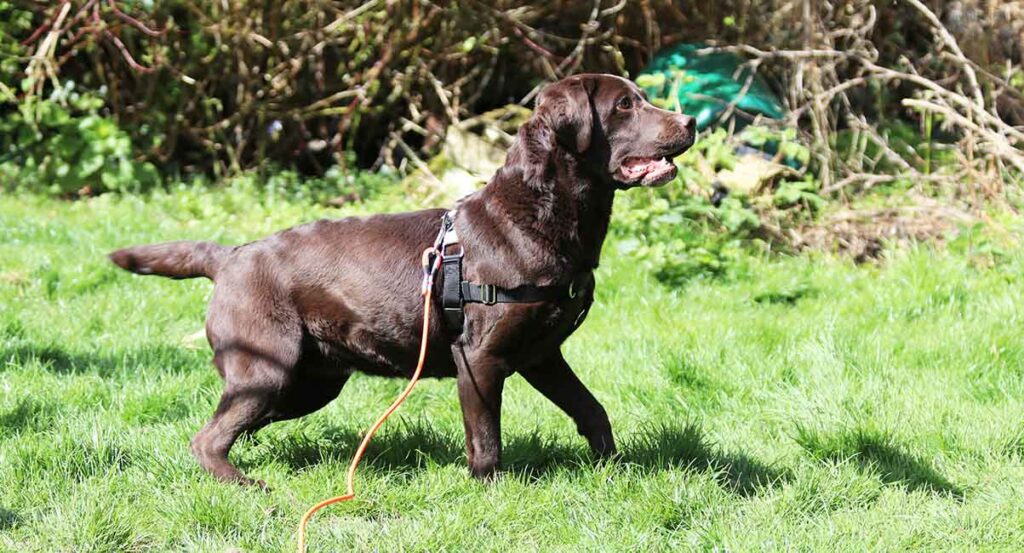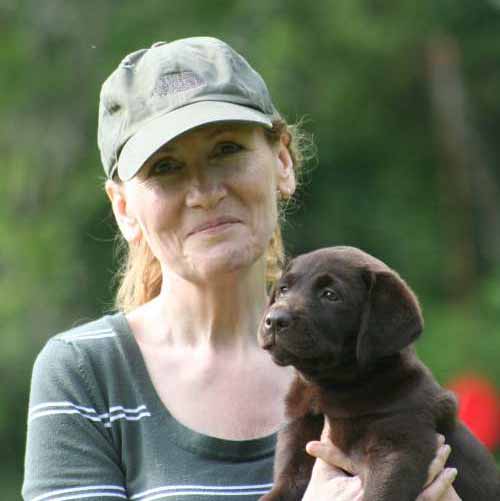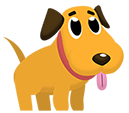I’m going to show you a simple game that teaches your dog to focus on you. But first I want to talk about why focus matters, and explain how easy it is to transform a dog that doesn’t listen, into a dog that hangs on your every word. You won’t need any special equipment and you can play this game at home.

When I first started training working gundogs many years ago, our dogs lived outdoors in purpose built kennels. And pretty much all our training took place outdoors. Whatever the weather, we were out there training in it, every day.
There were advantages and disadvantages to this. But one of the biggest disadvantages was the missed opportunities to teach attention and focus skills before exposing dogs to the distractions of the outside world.
Nowadays, all my dogs are raised indoors with me and my family. And I find this gives me a great head start when it comes to teaching dogs to pay attention and focus on me.
Why focus matters
If you’ve ever taught anything to anyone, you’ll know how important it is to get their attention first. For the most part, it’s not the smartest kids in the class that get the best grades. It’s the most attentive.
And the same applies to dogs. It doesn’t matter how clever your dog is, all dogs are smart enough to learn basic obedience. It only matters that they pay attention.
So the very first thing you do when training any dog, is teach them to listen and focus on you. Happily, this is a very straightforward process. And all it requires is that you have control over your dog’s food.
Why many dogs don’t listen
Dogs don’t listen because in the past, not listening has been more rewarding for them than listening.
Many people only realise how much this matters, when they try to get their dog to listen outdoors. And discover that no amount of awesome rewards makes any difference at all.
This is a common reason for people to conclude that training with food doesn’t work.
Dogs that don’t listen have been heavily rewarded for ignoring their human partners, largely because those humans did not know how to prevent that happening. And because they did not know how to reward good behaviors effectively.
The rewards that your dog earns from the environment compete with rewards that you keep in your treat bag, and understanding how to get around this, is an important part of learning how to train without force or fear.
If you would like to learn more about how the rewards that dogs are given, by you and by their environment, reinforce your dog’s behavior check out this article: Operant Conditioning In A Nutshell For Dogs And Their People
Teaching a dog to focus on you is a process that begins at home. With simple games that show your dog you are actually worth listening to. Here’s an example:
A simple focus game
Have plenty of treats in your treat bag or pot. Put up to ten treats in your hand.
STEP 1
Don’t say anything yet! Just drop a treat on the ground for your dog, move a couple of steps away, drop another treat. Move around dropping treats at two second intervals. When you have used up your treats reload your hand.
STEP 2
Drop the first treat and move a couple of steps away. Stand still and wait for the dog to look at you. As soon as he or she does so say “YES” and drop a treat. Repeat then reload your hand. Repeat step 2 until the dog looks at you after every treat without you needing to make a noise or attract their attention in any way.
If the dog doesn’t look at you within five seconds, you can make a kissing noise with your mouth to get them to do so.
STEP 3
Drop a treat on the floor to one side of you. As soon as the dog turns their head towards you say “YES” and drop a treat to the other side. Repeat Step 3 dropping treats further away from you. Mark every glance with a “YES” and reinforce with another treat. Repeat until you have used up your treats or five minutes have passed. Throw the treat in a different direction each time.
STEP 4
Sit on a chair or on the floor and repeat Step 3
STEP 5
Repeat the exercise but this time delay your marker YES for a second or two so that the dog has to maintain eye contact with you for a little longer.
Practice rewarding your dog for eye contact in more sessions, you can also take any opportunities that arise to do this throughout the day.
Getting more eye contact
This game teaches your dog to offer eye contact in return for food. Eye contact from your dog is a sure sign that they are paying attention to you, rather than just trying to ‘will’ the food from your hand.
Your dog will benefit from you reinforcing eye contact at any time. Try holding out for eye contact before giving your dog a toy, or opening the door for them.
Once a dog has played this focus game they’ll often offer that eye contact very quickly if you just stand still and wait. But if not, you can use that kissing sound as an interim step. And it won’t be long before your dog is offering eye contact whenever they want something from you.
Other ways to learn
If you are a visual learner, you’ll find videos to accompany this and the other focus training games in our Foundation Skills online course.
This game is just a start of course. And you don’t have to restrict yourself to focus games in order to increase your dog’s focus on you. The great news is, that all training improves focus.
All training increases focus
So any game, trick or skill that you decide to teach your dog will help to build their focus on you, provided that you begin at home or where there are very few distractions. And provided that you follow a few simple rules when you do begin to introduce distractions into your training sessions.
Dogs that play short simple games with their people, on a regular basis, rapidly develop a habit of paying attention to them.
And rather like compound interest this has a cumulative effect with the dog learning faster because they are more attentive, and becoming more attentive because they find you increasingly rewarding to be around.
This is why trick training is useful, even if the trick itself isn’t. Every training session you have with your dog is beneficial. And simple games take just two or three minutes of your time.
Why not make a start today? It’ll be fun. And you’ll find support and encouragement in our Facebook group if you need it!

Free Training Tips
Get Pippa's free dog training tips delivered to your inbox

 The 3 Ds Of Dog Training: Simple Rules To Help Your Dog Learn
The 3 Ds Of Dog Training: Simple Rules To Help Your Dog Learn
I have a problem with my dog going out. If she is on a harness or lease she will just stand right outside the door. If I take it off she runs and chases cats and won’t come back
Hi Regina. Might her harness or leash be uncomfortable for her, perhaps?
My lab is very timid .I’ve done lots of work to build his confidence but at nearly 9 months old he still won’t walk along a busy road .I still have to drive a few hundred yards to out park to walk him which is not ideal .Any suggestions please v
Hi Carol – sorry to hear that, that doesn’t sound much fun for either of you. Take a look at this article for some tips on helping him get used to being out and about 🙂
I have terrible trouble with my two 11 month olds chasing any moving wheels. Tractor, vans, vars, bycikles, mobility scooters, scooters
Please help
Many thanks
Hi Margaret. This sounds a real worry for you. Safety comes first, so we recommend you keep your pups on a leash anywhere they could potentially encounter traffic, while you retrain a really reliable recall (Pippa’s book ‘Total Recall’ is great for this). Do pop over to the ‘Dogsnet Training Advice and Support’ facebook group if you’d like more support with this – we’d love to see you there!
Sammie